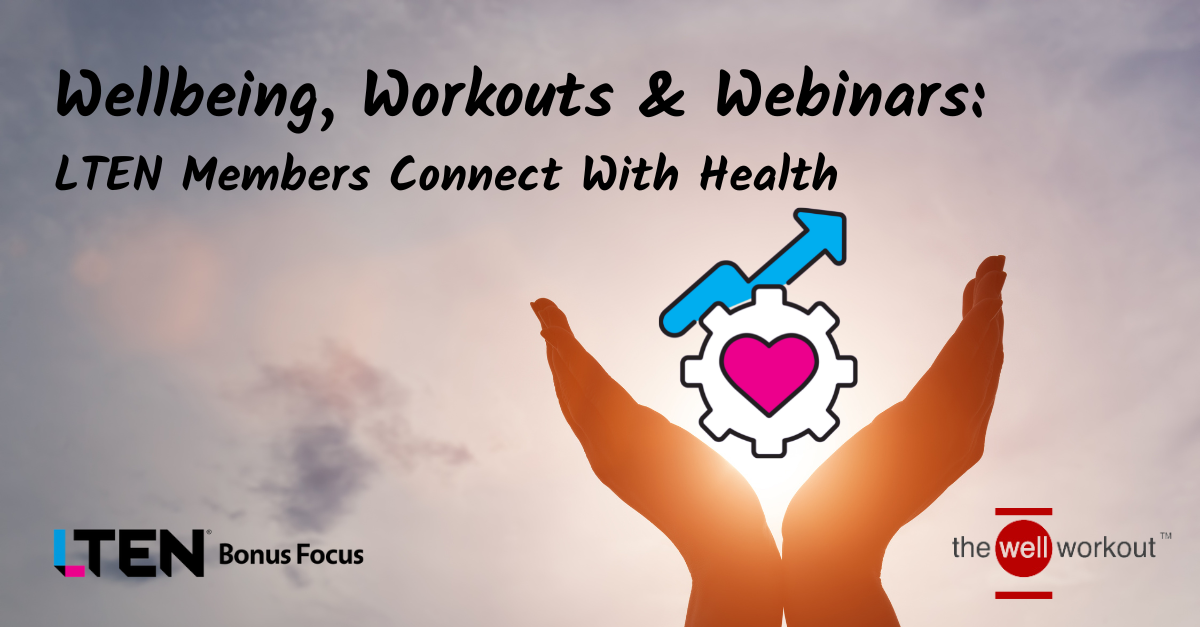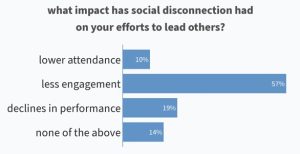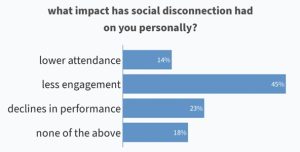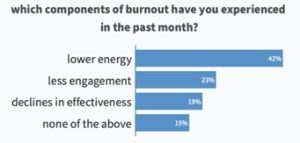
By Deborah Bonzell
Editor’s Note: Wellbeing expert and trainer Deb Bonzell has been kind enough to share her knowledge and insight into healthy lives – personally and professionally – with LTEN members in many formats. In this article, she recaps her workshop at the 51st LTEN Annual Conference and her March 11 and May 20 “Wellbeing Rx” webinar series produced with LTEN.
The LTEN Annual Conference Workout Workshop
On June 15, 32 curious and kind-hearted humans joined an afternoon workshop in San Antonio devoted to exploring one important and timely question:
How can we shift from feeling burned out to being fired up about or work and life?
After reflecting on the pervasiveness of employee burnout and its impact on our health, happiness and performance, the group engaged in a 20-minute workout, a “no sweat” interval-style wellbeing practice experience that has been proven to ease exhaustion and enhance enjoyment of daily work-life (including attending large out-of-town conferences in 100-degree heat!).
Here are three key takeaways from the session, based on attendee input:
-
Feeling burned out is a nearly universal shared experience.
An informal hand-raise style poll revealed that almost everyone in the room had, in the past month, experienced one or more of the three components of employee burnout, as defined by the World Health Organization:
-
- lower energy (most of us)
- less engagement (nearly half of us)
- decreased effectiveness (about a quarter of us)
-
Practicing the skills of wellbeing together made every one of us feel better.
After doing four simple, science-based wellbeing exercises — resting our body/mind, reflecting on one thing we’ve recently learned, connecting with another person by exchanging insights, and playing by stretching, smiling and laughing — the positivity of self-reported wellbeing descriptions increased 55% and the distribution of wellbeing ratings shifted upward by 30%. Not a bad ROI for a few minutes of skill-building!
-
Fostering a culture of wellbeing at work takes all of us.
At the close of our session, each participant wrote out a personalized permission slip as a reminder to fuel their passions by doing at least 10 minutes of wellbeing practice each workday. We reaffirmed our birthright to live and work in balance and committed to being ambassadors for wellbeing in our teams, families, organizations, and communities.
What word describes your current state of wellbeing?
Before … 45% positive. After … 100% positive.
Thanks again to everyone who contributed to this enlivening experience. Together, we validated what science has already shown: Wellbeing is a skill that can be learned and practiced in ways that are easy, effective and enjoyable.
To our “wellth!”
Webinar Wrap Up: The Medicine of Connection
On March 11, 31 members and guests joined LTEN’s first of four Wellbeing Rx webinars to explore — and experience — the healing power of social connection.
Facilitated in the style of a virtual campfire circle, attendees shared their personal experiences of social isolation and loneliness, offered best practice tips for facilitating connection without compromising content, and engaged in a short wellbeing practice to strengthen their “connection muscle.”
Here are three key take-aways from this heartfelt dialogue:
- The biggest impact of social disconnection has been decreased engagement.
Significant declines were also reported in the areas of attendance and performance, both when thinking about recent efforts as both leaders and humans. (See charts 1 and 2)
- Facilitating connection isn’t hard — but it requires intention and compassion.
Whether you’re leading a training session or collaborating with your team, you can ease loneliness and build rapport by remembering the wise guidelines:
-
- be inclusive and in tune with how introverts vs. extroverts prefer to engage
- Ask open, curious questions and allow participants to answer each other
- Share your own real, honest, genuine emotions
- Align around a shared purpose and mission
- Take empathic, caring action
- Listen more than you speak
- Use personal stories to connect
- Model patience
- Laugh together
- Lean into kindness
- Practicing connection quickly boosts our wellbeing.
Just like a B-12 shot, social connection floods our brains with mood-enhancing endorphins, leading to a greater sense of physical, mental, emotional, and social wellbeing. Following our “campfire sharing” and a five-minute practice in which attendees reflected on the many ways that others are just like us, the positivity of the group’s self-reported wellbeing descriptions increased 35%. Not a bad ROI for a few minutes of skill-building!
What word describes your current state of wellbeing?
Before … 65% positive. After … 100% positive.
Thanks again to everyone who joined this enlivening conversation. Together, we validated what science has already shown: social connection is healing medicine.
Webinar Wrap Up: The Power of Play
On May 20, 34 members and guests joined LTEN’s second of four Wellbeing Rx webinars to explore — and experience — the transformative power of play.
Facilitated in the spirit of a friendly playground meet-up, attendees shared their personal experiences of overwork and burnout, offered best practice tips for facilitating play during the workday and engaged in a short wellbeing practice to reconnect with their innate childlike playfulness.
Here are three key take-aways from this spirited dialogue:
- The biggest impact of burnout has been decreased energy.
Significant declines were also reported in the areas of engagement and effectiveness. Fortunately, 15% of those attending reported none of these symptoms. (See chart 3)
- Playing together comes naturally—when we give ourselves permission.
Whether you’re leading a training session or collaborating with your team, you can ease exhaustion and amplify enjoyment by using these proven techniques:
-
- Use games for ice breakers, who’s who contests and knowledge challenges
- Play walk-on songs and take music/dancing breaks
- Engage participants around a shared project
- Select themes for meetings
- Get outside
- Share funny memes, gifs and emojis via chat
- Set a ground rule: “If we’re not having fun, we’re not doing it”
- Relax and remember to use humor and laughter whenever possible
- Practicing play quickly enhances our wellbeing.
When we smile, laugh and move playfully, our brains are flooded with a cocktail of “feel-good” endorphins, leading to a greater sense of physical, mental, emotional and social wellbeing. Following our group “playdate,” including a five-minute practice in which attendees stretched their bodies and imaginations, made joyful sounds and laughed for no reason, the positivity of self-reported wellbeing descriptions increased 41%. Not a bad ROI for a few minutes of skill-building!
What word describes your current state of wellbeing?
Before … 48% positive. After … 89% positive.
Thanks again to everyone who contributed to this enlivening experience. Together, we validated what science has already shown: play is powerful!
Mark your calendars for Friday, Aug. 5, when LTEN hosts our next Wellbeing Rx webinar on The Wisdom of Reflection, and for Friday, Nov. 4, when we talk about The Imperative of Rest. Register today at www.L-TEN.org/webinars to save your spot and join us for these thought-provoking sessions.
Deborah Bonzell is a former life sciences trainer and the founder of The Well Workout. Email her at deb@thewellworkout.com.[/vc_column_text][/vc_column][/vc_row]











